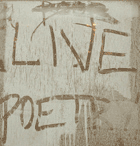(March 2005) In The Life of Poetry, Muriel Rukeyser describes poetry as
a way to allow people to feel the meeting of their consciousness and the world, to feel the full value of the meanings of emotions and ideas in their relations with each other, and to understand, in the glimpse of a moment, the freshness of things and their possibilities.... The work that a poem does is ... transfer ... human energy, and ... human energy may be defined as consciousness, the capacity to make change in existing conditions. It appears to me that to accept poetry in these meanings would make it possible for people to use it as an ‘exercise,’ an enjoyment of the possibility of dealing with the meanings in the world and in their lives.
Jane Cooper said something similar, alluding back to Rukeyser:
Poetry ... demands full consciousness on the part of the writer, and full response on the part of the witness/reader to the truths of feeling ... [a] genuine exchange....Through poetry we are brought face to face with our world and we plunge deeply into ourselves, to a place where we sense ‘the full value of the meanings of emotions and ideas in their relations with each other, and ... understand, in the glimpse of a moment, the freshness of things and their possibilities.’
Rukeyser also said "the universe is made up of stories, not atoms."
Sigmund Freud said “everywhere I go I find a poet has been there before me.”
Malamud said “you can’t eat language but it eases thirst.”
Picasso said “art is the lie that reveals truth.”
Gaston Bachelard said “the great function of poetry is to give back to us the situations of our dreams.”
Leonard Cohen said “poetry is just the evidence of your life. If your life is burning well, poetry is just the ash.”
John Ruskin said “the greatest thing a human being ever does is to see something and tell what [she] sees in a plain way.”
Henry James said (and I love this), “We work in the dark. We do what we can. We give what we have. Our doubt is our passion. Our passion is our task. The rest is the madness of art.”
And Tim Robbins said that poetry “is nothing more than the intensification or illumination of common objects and everyday events until they shine with their singular nature, until we can experience their power, until we can follow their steps in a dance, until we can discern what parts they play in the Great Order of Love. And how is this done? By fucking around with syntax.”
And what do I say? I say it’s 10 PM on a Monday night and a good three hours before I can usually manage to fall asleep, but I am exhausted and the one beer I opened when I thought I would be settling in to watch the women’s ACC basketball tournament title game just made me sleepier, so I am taking advantage of this rare exhaustion and going to sleep.
If Bachelard is correct, then perhaps I will wake up with poetry in my head, since I will spend more hours dreaming tonight than is typical for me.
It’s 5 after 10. Good night.


No comments:
Post a Comment